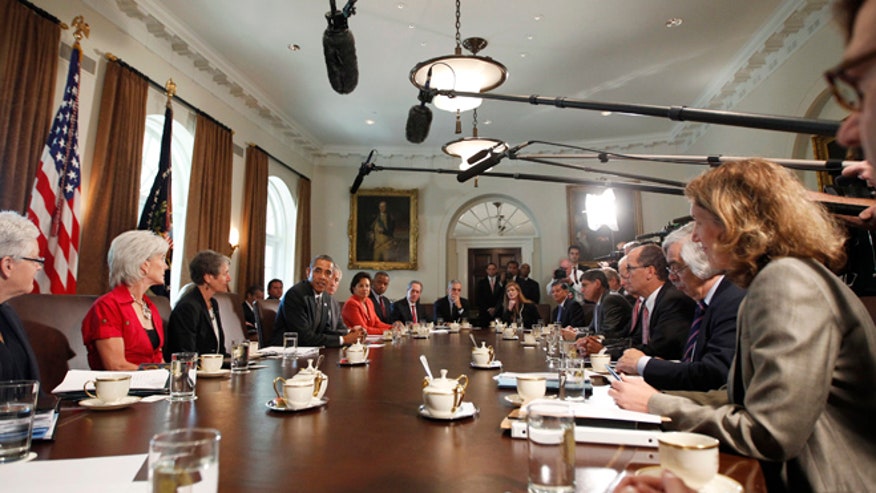Regulation Nation: Gov't regs estimated to pound private sector with $1.8T in costs
FoxNews.com

Sept. 12, 2013: President Obama speaks during a Cabinet meeting in the West Wing of the White House in Washington.Reuters
A new report on the government's regulatory actions was released just before Thanksgiving, and it contains more than 3,300 rules -- which the Competitive Enterprise Institute (CEI) estimates will, together with other regulations, cost more than $1.8 trillion to implement on an annual basis.
At a time when the economy is still struggling to zoom out of its post-recession rut, businesses worry that the crush of regulation is another sandbag weighing down the recovery.
"Back in the '90s, the federal budget itself was not even $1.8 trillion," said Wayne Crews, vice president of policy for CEI. "Now we have this entire $1.8 trillion hidden tax, you could say, of government compliance and intervention cost imposed in the economy."
The latest monthly jobs report from the Labor Department showed gains in hiring in November, which helped push the unemployment rate down to 7 percent, a five-year low. But many of the new jobs added in the last several months were low wage, and more growth is needed for the economy to truly rebound.
Crews reviewed the latest regulation round-up, a twice-annual compilation called the Unified Agenda of Federal Regulatory and Deregulatory Actions.
Because the majority of the regulatory costs will be borne by private industry, Crews said that will ultimately mean higher costs for consumers.
According to CEI, the biggest cost comes from environmental regulations, adding up to roughly $379 billion.
But Jeremy Symons, senior director of climate policy for the Environmental Defense Fund, said those regulations are necessary to ensure clean air and water for future generations.
"There is a balancing of the costs and benefits to find the best approach forward," Symons said. He also noted that all federal regulations undergo a vetting process including input from the public and the industries that will be impacted.
There have been several bipartisan efforts on Capitol Hill to get a better handle on the growing number of regulations and to press for more transparency from the agencies issuing them. According to CEI, 127 federal laws were passed last year, but more than 3,700 regulations were issued.
It's a trend that troubles even the president's own supporters.
George Washington University Law professor Jonathan Turley, testifying before the House Judiciary Committee this week, warned of what he called "the continued rise of this fourth branch."
Unlike lawmakers, the people issuing the regulations -- which often impose hefty fines and/or jail time for defying them -- never have to face voters.
Courts are often the chosen remedy, and there are two significant cases challenging the EPA's power currently pending at the Supreme Court.
Shannon Bream joined Fox News Channel (FNC) in 2007 and is a Washington-based correspondent covering the Supreme Court. She also serves as the anchor of "America's News Headquarters" (Sundays at 12-2PM/ET).

No comments:
Post a Comment